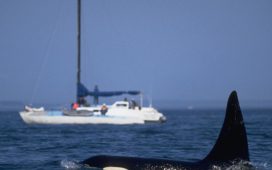Disturbing new footage shows the barbaric training process dubbed ‘the crush’ that baby elephants undergo in Thailand to get them ready to interact with tourists.
Undercover footage, filmed by charity World Animal Protection (WAP), shows seven baby elephants being subjected to the cruel practice in 2018, 2019 and 2020, after being torn away from their mothers at the age of two and placed in isolation.
Trainers use bull hooks, sticks and nails to inflict pain on the crying calves during two sessions a day so they learn to submit to humans, footage shows. They are then chained and tied by their neck and ankles to a wooden frame called a ‘crush’ box.
One video shows the trainers, or the ‘mahout’, washing the blood off an exhausted calf’s head after she has undergone a day of brutal training. Others can be seen with scars on their heads after being punished for not doing tourist tricks properly such as dancing, hula hooping, painting, walking on their hind legs or giving rides to humans.
WAP is urgently calling for an overhaul of the way captive elephants are treated and a permanent breeding ban, before tourism gradually resumes in Thailand and other holiday destinations, following the collapse of the industry during the pandemic.
UK Wildlife Campaigns Manager for WAP, Katheryn Wise, told Metro.co.uk: ‘With a lack of tourism during coronavirus, a lot of elephants are in dire circumstances.
‘Some are being returned to their owners and back to villages and there’s a real fear that they may be bred while they’re not able to work and all that does is perpetuate the issue in 22 months – you will just have more elephants in the cruel system.’
‘They live a pretty horrible life in captivity because they’re basically there for tourists’ entertainment,’ she added.
Katheryn said the process, which is thought to have been used since the 1990s, starts with the mother and baby being led away from home and chained up. The calf is then tied to another adult ‘separation elephant’ in the hopes it will go more willingly from its mother – but the process is traumatic for both.
One video shows elephant Gintaala being separated from her calf Boonshoo – the fourth she has had taken away. But Boonshoo refuses to leave and Ginataala is seen trying to protect her with her trunk.
As her baby is tugged away, the mother cries in distress and throws her head and trunk back and forth, tugging at her chains. At one point, off camera, she broke free and tried to chase after her baby but was restrained again, said WAP campaigners.
Boonshoo is then seen tied up alone, crying and stumbling to the floor while trying to free herself as her life in captivity begins.
‘The idea of the process is to break the elephant down, so it is responsive to the trainers and they are able to train them to do all the tricks that you see in the tourism industry,’ added Katheryn.
‘Because elephants grow to be such big animals and they’re so powerful, that in order for them to be able to interact with humans on a close level, they have to be able to be controlled by the mahout.’
Katheryn said many trainers are not necessarily doing the process to be ‘inherently cruel’, but more they see it is a way to control the animals so they can safely be used to entertain humans.
‘The trainers very much believe if they don’t use these practices the elephants are higher risk to people and would be responsible if a person was to be injured or killed by them,’ she added.
‘The use of elephants in the tourism industry has increased because more people want to take a ride on an elephant, or swim with an elephant, and that demand increases this practice.’
She added that the process causes great psychological trauma to elephants, who have matriarchal systems and would usually stay with the mother for generations in a herd.
‘Quite often you seem them swinging their head repetitively or stereotypical behaviours that show the training has had psychological effect on that elephant,’ she added.
WAP is now urging for tourists to do their research before visiting so-called elephant ‘sanctuaries’ or ‘retirement homes’ in Thailand, where there is no regulation around such venues.
Katheryn said: ‘If the venue allows you to ride, bathe with, wash or hug an elephant – any close interaction in that way without a barrier – those are big red flags that you should probably stay away.’
The campaigner said to stick to centres that are observation only and allow no human interaction.
‘A lot of tourists are going to these places because they love elephants – they have no idea that this stuff goes on behind the scenes,’ added Katheryn.
‘This is why we’re releasing this video because as horrible as it is to watch, we can’t just look away and pretend that doesn’t happen.
‘We’re trying to get tourists to recognise that this happens and realise that they have a power to change the system because they’re creating the demand for these interactions.’
WAP is calling on the public to sign a petition urging the UK government to champion a global wildlife trade ban at the G20 meeting of leaders in November.
Get in touch with our news team by emailing us at webnews@metro.co.uk.
For more stories like this, check our news page.






















